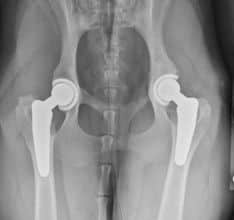
Hip dysplasia affects thousands of residents throughout the greater Atlanta community, predominantly those under the age of 50. Initially considered to be a childhood disease, hip dysplasia is one of the most under diagnosed conditions because of how it develops and the kind of symptoms it produces. Patients who suffer from hip dysplasia often do so as a result of a developmental disorder that causes their hips to grow irregularly, although there are other factors that can contribute to this issue.
Hip dysplasia occurs when the ball joint found in the upper thighbone isn’t completely covered by the hip socket. This can cause the joint to become dislocated, leading to other issues in the hip and other parts of the body as the person ages.
Hip Dysplasia: Who It Affects
Studies show that hip dysplasia can be caused by genetics, and while it can affect either hip, it most often affects the left one. Although most cases involve people under the age of 50, women, first-born children, and babies born in the breech position or with deformities of the foot are most vulnerable to this condition. Larger babies can also be more at risk of hip dysplasia because they may be too crowded in the womb. This can actually cause the hip joint to move out of position.
It’s not always easy to determine if you’re suffering from hip dysplasia. The condition isn’t widely known, and many people assume hip problems are something they will deal with when they’re older, not something that can occur in their child or teenage years. If you suffer from hip dysplasia or suspect you may have the condition, contact our Atlanta orthopedic doctors for diagnosis and treatment. This condition doesn’t have to affect your life.
[ctaforBlog]
Symptoms of Hip Dysplasia
The symptoms of hip dysplasia differ depending on age. In infants, for example, it can often be noticed in the lengths of the legs—one leg will actually be a little bit longer because of how the joint sits. It may also be more difficult to get one of the baby’s legs to move as much while changing diapers because the hip on that side of the body is not as flexible.
When they begin walking, children with hip dysplasia often have a small limp. This limp can become worse and more noticeable as they age. By the time they are teens, those with untreated hip dysplasia may have developed a labral tear in the hip or osteoarthritis. This can result in pain and difficulty playing sports or other physical activities. Because of this, it’s important to have the condition diagnosed and treated as soon as possible. Parents who believe their child has hip dysplasia need to take the condition seriously and seek treatment.
How Orthopedic Doctors Diagnose Hip Dysplasia
When the hip socket grows irregularly, normal movement causes the protective fibrocartilage in the hip to absorb the majority of your body’s weight, which would otherwise be distributed evenly across each part of the hip joint. Over time, the cartilage diminishes, causing hip damage and making it difficult to move. If left untreated, osteoarthritis can develop.
One of the reasons why hip dysplasia is one of the most underdiagnosed conditions is because it does not cause any pain or discomfort in its early stages. However, because of how this disease affects your body’s weight distribution, the affected bones can cause other health complications.
Most patients who experience hip dysplasia notice sensations that are focused in locations outside of the hip, which can become irritating during physical activity or at night. In many cases, they believe something is wrong in these other areas rather than with their hips. This also contributes to the condition going undiagnosed.
[ctaforBlog]
Because it is a genetic condition, infants are examined for hip dysplasia early on during their well-baby checkups. This is because hip dysplasia can be diagnosed early on and, in most cases, corrected using a soft brace that will hold the hip joint together. This brace is usually only worn for a few months. If it’s not correctable with a brace or if it’s found later in life, it may be corrected using other methods, including surgery.
Atlanta Orthopedic Treatment for Hip Dysplasia
Unless a patient suffering from hip dysplasia is diagnosed and treated during their childhood years or before their hip joints have completely developed, surgery is often the only option. However, the orthopedic doctors at AICA Orthopedics attempt to avoid this particular path to recovery. In most cases, unfortunately, patients do require total hip replacement or arthroscopic treatment in order to provide relief and improve their range of motion.
Based on the results of your examination, your orthopedic doctor can develop a personalized treatment plan that aligns with the unique characteristics of your condition, other medical conditions, and your overall health.
Contact AICA Orthopedics For More Information or Complete Treatment
If you suffer from hip dysplasia, contact the medical team at AICA Orthopedics to learn more about our approach to treatment or to schedule an examination. Our Atlanta orthopedic clinic is open Monday through Sunday and welcomes same-day appointments. You can speak with one of our friendly staff members by dialing (404) 855-2141.





